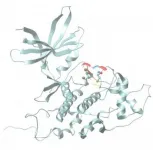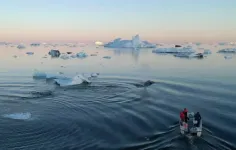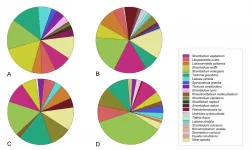Study finds future too warm for baby sharks
Climate change causing sharks to be born smaller, undernourished
2021-01-12
(Press-News.org) A new study conducted at the New England Aquarium finds that as climate change causes the ocean to warm, baby sharks are born smaller, exhausted, undernourished, and into environments that are already difficult for them to survive in.
In a recently published paper in the journal Scientific Reports, lead author Carolyn Wheeler, a Ph.D. candidate at the University of Massachusetts Boston and at the ARC Centre of Excellence for Coral Reef Studies at James Cook University, examined the effects of increased temperatures on the growth, development and physiological performance of epaulette sharks--an egg-laying species found only on the Great Barrier Reef. Wheeler studied the sharks as embryos and hatchlings, under the supervision of Dr. John Mandelman, Vice President and Chief Scientist of the Anderson Cabot Center for Ocean Life at the New England Aquarium.
"We found that the hotter the conditions, the faster everything happened, which could be a problem for the sharks," said Wheeler. "The embryos grew faster and used their yolk sac quicker, which is their only source of food as they develop in the egg case. This led to them hatching earlier than usual." Wheeler said the hatchlings were not only smaller, but they needed to feed almost immediately while lacking significant energy.
"The ocean faces increasing threats from humans, such as the effects of climate change, and it is vital to conduct scientific research to help strengthen the management and protection of those ocean species most negatively impacted and vulnerable," Mandelman said. "In this case, we addressed a pressing threat--ocean warming--and the potential impacts on a species that could serve as a model for other egg laying species among sharks and their relatives."
The Aquarium has a successful breeding program for epaulette sharks, allowing the researchers to use some of the eggs to study climate change impacts on a shark species native to the other side of the world. The research was housed at the Aquarium's Animal Care Center in Quincy, Mass. under the direction of Barbara Bailey, Curator of Husbandry and Sustainability.
"This work included the efforts of staff, volunteers and interns across a number of departments. I was very excited to find a connection between the animals in our exhibits and the opportunity to contribute to an incredibly important scientific study," said Bailey.
Co-author and Associate Professor Jodie Rummer, Wheeler's co-supervisor at James Cook University, says the waters of the Great Barrier Reef will likely experience summer averages nearing or even exceeding 31°C/87.8°F by the end of the century. Sharks do not care for their eggs after they are laid, meaning a shark egg must be able to survive unprotected for up to four months. Rummer cites rising ocean temperatures as a major concern for the future of sharks, particularly those that lay eggs.
"The epaulette shark is known for its resilience to change, even to ocean acidification. So, if this species can't cope with warming waters, then how will other, less tolerant species fare?" Rummer said.
Sharks and the class of animals they belong to, which includes rays and skates, are slow growing. They also do not reproduce often compared to other fishes. The populations of many of these creatures are already threatened across the globe. The study suggests the sharks of the future will be born--or hatch, in this case--not only at a disadvantage but into environments already at the warmest they can tolerate.
Epaulette sharks reared through the New England Aquarium's husbandry and sustainability program can be seen on exhibit in the Shark and Ray Touch Tank at the Aquarium's main building on Boston's Central Wharf. The Aquarium is currently closed to the public as part of the City of Boston's restrictions to slow the spread of COVID-19.
INFORMATION:
[Attachments] See images for this press release:

ELSE PRESS RELEASES FROM THIS DATE:
2021-01-12
It's been more than a year since the first cases were identified in China, yet the exact origins of the COVID-19 pandemic remain a mystery. Though strong evidence suggests that the responsible coronavirus originated in bats, how and when it crossed from wildlife into humans is unknown.
In a study published online Jan.12 in the journal mBio, an international team of 15 biologists say this lack of clarity has exposed a glaring weakness in the current approach to pandemic surveillance and response worldwide.
In most recent studies of animal-borne pathogens with the potential to spread to humans, known as zoonotic pathogens, physical specimens of suspected wildlife ...
2021-01-12
Exercising regularly is one of the best defences against metabolic diseases, such as obesity and diabetes - but why? It's a question that scientists are still struggling to answer. While exercising changes the molecular behaviour of muscles, it's not well understood how these molecular changes improve metabolic health.
Scientists at the University of Copenhagen have now developed a new technology that allows researchers to study muscle biology on a more detailed level - and hopefully find some new answers. They extracted 'fast' and 'slow' twitch muscle fibers from freeze-dried muscle samples that were taken before and after 12 weeks of cycling exercise training. Their comprehensive analysis of the protein expression of the fibers provides new evidence that the ...
2021-01-12
BOSTON -- By mid-November, the Centers for Disease Control and Prevention had reported that 218,439 health care workers in the U.S. had been infected with COVID-19 -- a likely underestimate due to incomplete data from states. About 3% to 4% of health care personnel who recover from coronavirus infection are expected to become "COVID long-haulers" as they cope with debilitating symptoms 12 to 18 months after the acute stage of the infection clears.
"As COVID-19 surges again, hospitals are facing a shortage of skilled frontline providers who can meet the relentless demands of caring for these patients," says Zeina N. Chemali, MD, MPH, a psychiatrist and neurologist at Massachusetts ...
2021-01-12
A group of scientists from Russia, China, and the United States predicted and then experimentally obtained barium superhydrides' new unusual superconductors. The study was published in Nature Communications.
Chemists and physicists have been hunting down room-temperature superconductors since the first half of the 20th century. Initially, high hopes were placed on metallic hydrogen, but solid metallic hydrogen can become superconducting only at extremely high pressures of several million atmospheres, as it later transpired. Chemists then tried adding other elements to hydrogen in the hope of attaining superconductivity by stabilizing the metallic state under less challenging conditions. ...
2021-01-12
Typically characterized as poisonous, corrosive and smelling of rotten eggs, hydrogen sulfide's reputation may soon get a face-lift thanks to Johns Hopkins Medicine researchers. In experiments in mice, researchers have shown the foul-smelling gas may help protect aging brain cells against Alzheimer's disease. The discovery of the biochemical reactions that make this possible opens doors to the development of new drugs to combat neurodegenerative disease.
The findings from the study are reported in the Jan. 11 issue of the Proceedings of the National Academies of Sciences.
"Our new data firmly link aging, neurodegeneration and cell signaling using hydrogen sulfide and other gaseous molecules within the cell," says Bindu Paul, M.Sc., Ph.D., faculty ...
2021-01-12
Climate changes prompt many important questions. Not least how it affects animals and plants: Do they adapts, gradually migrate to different areas or become extinct? And what is the role played by human activities? This applies not least to Greenland and the rest of the Artic, which are expected to see the greatest effects of climate changes.
'We know surprisingly little about marine species and ecosystems in the Arctic, as it is often costly and difficult to do fieldwork and monitor the biodiversity in this area', says Associate Professor of marine mammals and instigator of the study ...
2021-01-12
Researchers from Skoltech and their colleagues have optimized data analysis for a common method of studying the 3D structure of DNA in single cells of a Drosophila fly. The new approach allows the scientists to peek with greater confidence into individual cells to study the unique ways DNA is packaged there and get closer to understanding this crucial process's underlying mechanisms. The paper was published in the journal Nature Communications.
The reason a roughly two-meter-long strand of DNA fits into the tiny nucleus of a human cell is that chromatin, a complex of DNA and proteins, packages it ...
2021-01-12
A study of students at seven public universities across the United States has identified risk factors that may place students at higher risk for negative psychological impacts related to the COVID-19 pandemic. Factors associated with greater risk of negative impacts include the amount of time students spend on screens each day, their gender, age and other characteristics.
Research has shown many college students faced significant mental health challenges going into the COVID-19 pandemic, and experts say the pandemic has added new stressors. The findings, published in the journal PLOS ONE, could help experts tailor services ...
2021-01-12
Announcing a new publication for Marine Life Science & Technology journal. In this research article the authors Hungchia Huang, Jinpeng Yang, Shixiang Huang, Bowei Gu, Ying Wang, Lei Wang and Nianzhi Jiao from Xiamen University, Xiamen, China and Sun Yat-Sen University, Guangzhou, China consider the spatial distribution of planktonic ciliates in the western Pacific Ocea: along a transect from Shenzhen (China) to Pohnpei (Micronesia).
Planktonic ciliates have been recognized as major consumers of nano- and picoplankton in pelagic ecosystems, playing pivotal roles in the transfer ...
2021-01-12
COLUMBIA, Mo. - As a former school nurse in the Columbia Public Schools, Gretchen Carlisle would often interact with students with disabilities who took various medications or had seizures throughout the day. At some schools, the special education teacher would bring in dogs, guinea pigs and fish as a reward for good behavior, and Carlisle noticed what a calming presence the pets seemed to be for the students with disabilities.
Now a research scientist at the MU Research Center for Human-Animal Interaction (ReCHAI) in the MU College of Veterinary Medicine, Carlisle studies the benefits that companion animals can have on families. While there is plenty of ...
LAST 30 PRESS RELEASES:
[Press-News.org] Study finds future too warm for baby sharks
Climate change causing sharks to be born smaller, undernourished





